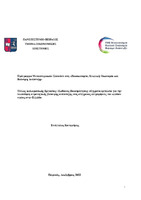Εκθέσεις βιωσιμότητας : σύγχρονα εργαλεία για την υλοποίηση στρατηγικής βιώσιμης ανάπτυξης στις σύγχρονες επιχειρήσεις του κλάδου υγείας στην Ελλάδα
Sustainability reporting : modern tools for the implementation of sustainability development strategy of companies in health sector in Greece

View/
Keywords
Εκθέσεις βιωσιμότητας ; Βιώσιμη ανάπτυξη ; Εταιρική κοινωνική ευθύνη ; ESG ; Κλάδος υγείας ; Φαρμακευτικές εταιρείες ; Εταιρική υπευθυνότηταAbstract
This thesis set out to examine sustainability reports as cutting-edge instruments for introducing a sustainable development strategy into cutting-edge Greek health care organisations.
Sustainable development, or sustainable development in its alternative form, is defined as "development that satisfies the requirements of the present without compromising the capacity of future generations to meet their own needs" by the World Commission on Environment and Development (WCED) in 1987.
Interest from businesses and institutions all around the globe has resulted from the vast range of advantages that come with its implementation. Specifically, many firms, both public and private, prioritise their strategy by considering the extent to which it will affect the world around them, including issues of sustainability, social responsibility, and corporate responsibility.
Companies active in the Greek health sector that had information directly accessible on their websites were the sample for the qualitative study. Based on the data, we learn that only 15% of companies in the pharmaceutical industry publish sustainability reports, while if we observe by sub-sector, this number increases to 26% for import/export companies, remains at 15% for Greek pharmaceutical industries and decreases drastically to 5% for those offering diagnostic/treatment services. The second major finding of the study was that the largest companies in terms of turnover in all health sub-sectors attach great importance to the interconnection of their economic, social and environmental responsibility, and therefore, are comparatively more active in promoting a culture ethics and sustainability across the healthcare industry as a whole. Of course, the regulatory framework has played a decisive role in this. Third, pharmaceutical import and export companies have the highest integration of ESG actions and activities, as well as the greatest variety and highest quality of sustainability reporting, compared to the rest of the industry as a whole.


